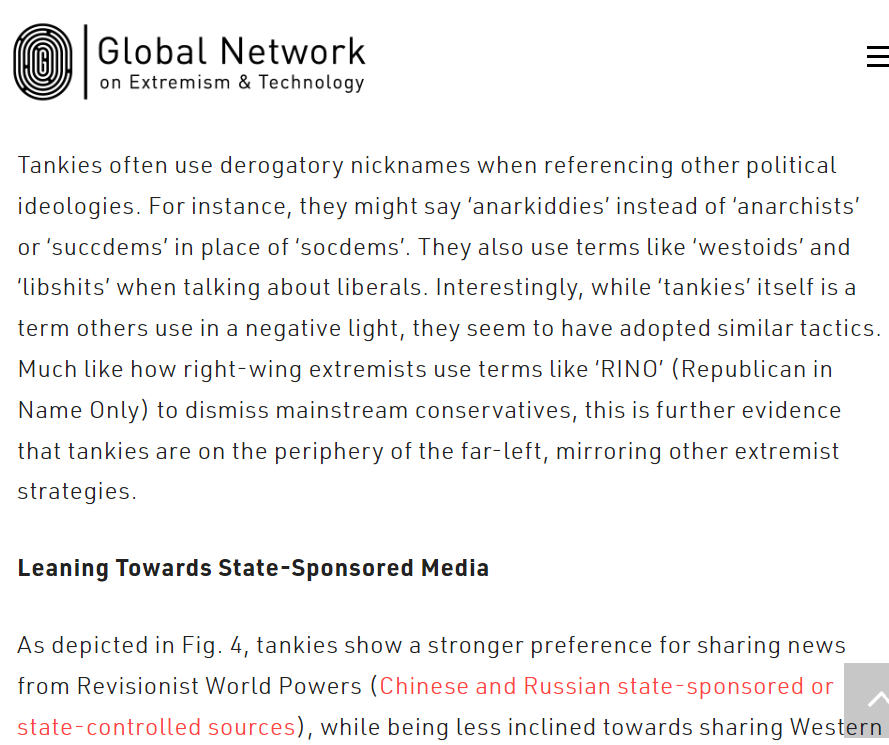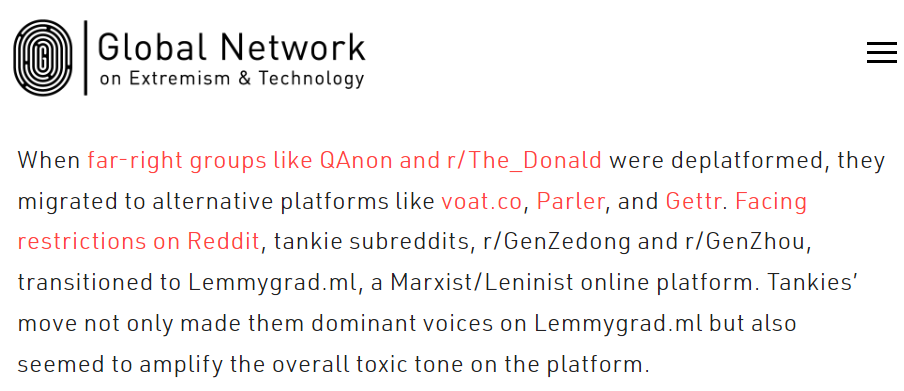this post was submitted on 23 Feb 2024
198 points (98.1% liked)
GenZedong
4874 readers
120 users here now
This is a Dengist community in favor of Bashar al-Assad with no information that can lead to the arrest of Hillary Clinton, our fellow liberal and queen. This community is not ironic. We are Marxists-Leninists.
See this GitHub page for a collection of sources about socialism, imperialism, and other relevant topics.
This community is for posts about Marxism and geopolitics (including shitposts to some extent). Serious posts can be posted here or in /c/GenZhou. Reactionary or ultra-leftist cringe posts belong in /c/shitreactionariessay or /c/shitultrassay respectively.
We have a Matrix homeserver and a Matrix space. See this thread for more information. If you believe the server may be down, check the status on status.elara.ws.
Rules:
- No bigotry, anti-communism, pro-imperialism or ultra-leftism (anti-AES)
- We support indigenous liberation as the primary contradiction in settler colonies like the US, Canada, Australia, New Zealand and Israel
- If you post an archived link (excluding archive.org), include the URL of the original article as well
- Unless it's an obvious shitpost, include relevant sources
- For articles behind paywalls, try to include the text in the post
- Mark all posts containing NSFW images as NSFW (including things like Nazi imagery)
founded 4 years ago
MODERATORS
you are viewing a single comment's thread
view the rest of the comments
view the rest of the comments


We're irrevocably on the far-left. Overall we want things to get better for everyone and for the world. A world without colonialism, without imperialism, without exploitation for everyone.
Yes, sometimes we lump all "libs" in the same basket and need to vent about it, and fascists lump all the "normies" in the same basket and vent about it too.
But the thing about horseshoe theory, which the global network article in the OP is circling around, is that it seems to make the conclusions and then observe the behavior. In other words, is it that the far-left and far-right have similar ideas, or is it that ideological minorities tend to be more vocal about their beliefs?
The right is very good at adopting left arguments and repackaging them in their weird worldview. I attribute that to two components:
First, reality is dialectical and materialist. It follows then that some people will eventually reach a dialectical materialist POV on issues. Something as simple as "The US does wars for oil" counts; their material conditions ("we can't exist as is without a rich bourgeoisie and oil makes the world go round") leads them to their ideas (make war).
Second, they don't believe in words and so it's really easy for them to just say shit and have it stick somewhere. They don't care about being antisemitic when talking about Palestine for example, and say whatever goes through their mind, which finds an audience. They don't care about alienating some people with these statements because they'll turn around in two minutes and say something completely different. If you fling enough paint at the wall, eventually, the whole wall will be painted.
If I want to write about Israel for example, I have to be careful about my language and properly explain Zionism every time and situate that the US is controlling Israel, and not the other way around. Right-wingers can just say "isn't it weird that we keep sending 3 billion dollars to fund Israel every year???" and you see in that what you want to see.
Nowadays for example, more and more right-wingers are talking about anti-imperialism. But anti-imperialism was championed and carried out by communists. The USSR was the longest and most successful anti-imperialist project. Many communist parties in the West have now abandoned this stance, or that of the class struggle, which has let the right pick it up in their own chauvinist way which is still unfolding.
Accordingly to this diamat worldview we have let's say "ideological enemies" and recognize them as such. This dates as far back as Marx and Engels, who reformed the Communist League into the First International, changing their utopian (idealist) slogan of "All men are brothers" to "workers of the world, unite!" because they realized that not all men are brothers; there is, in class society, a class of people who want to oppress you and do oppress you when they have the power to do so.
We're very pragmatic because we understand how the material conditions drive historical change (which is not a blank check to do whatever we like under the justification that it's just the logical conclusion, mind you). For example, we don't want war. I think all the conflicts currently existing show that war is not something one should wish on themselves. But we understand it as part of the material world, as something that exists out of certain conditions. Clausewitz for example (who was dialectical but lived far before socialism was even a thing) said that "war is the continuation of politics by other means"; he saw war as part of a process, something that exists because this process had been allowed to reach a certain point. He didn't see war as something people could talk themselves out of if they believed in peace hard enough, and accordingly war will not be solved by wishing for it to end. It needs pragmatic, real world conditions to stop.
I think this is what drives a wedge between the "moderate" left if I may call it that, and communists. We don't want people to die needlessly and we want to build rather than destroy, but we understand that sometimes, stuff we don't want to happen still happens.